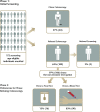Improving compliance to colorectal cancer screening using blood and stool based tests in patients refusing screening colonoscopy in Germany
- PMID: 25326034
- PMCID: PMC4287474
- DOI: 10.1186/1471-230X-14-183
Improving compliance to colorectal cancer screening using blood and stool based tests in patients refusing screening colonoscopy in Germany
Abstract
Background: Despite strong recommendations for colorectal cancer (CRC) screening, participation rates are low. Understanding factors that affect screening choices is essential to developing future screening strategies. Therefore, this study assessed patient willingness to use non-invasive stool or blood based screening tests after refusing colonoscopy.
Methods: Participants were recruited during regular consultations. Demographic, health, psychological and socioeconomic factors were recorded. All subjects were advised to undergo screening by colonoscopy. Subjects who refused colonoscopy were offered a choice of non-invasive tests. Subjects who selected stool testing received a collection kit and instructions; subjects who selected plasma testing had a blood draw during the office visit. Stool samples were tested with the Hb/Hp Complex Elisa test, and blood samples were tested with the Epi proColon® 2.0 test. Patients who were positive for either were advised to have a diagnostic colonoscopy.
Results: 63 of 172 subjects were compliant to screening colonoscopy (37%). 106 of the 109 subjects who refused colonoscopy accepted an alternative non-invasive method (97%). 90 selected the Septin9 blood test (83%), 16 selected a stool test (15%) and 3 refused any test (3%). Reasons for blood test preference included convenience of an office draw, overall convenience and less time consuming procedure.
Conclusions: 97% of subjects refusing colonoscopy accepted a non-invasive screening test of which 83% chose the Septin9 blood test. The observation that participation can be increased by offering non-invasive tests, and that a blood test is the preferred option should be validated in a prospective trial in the screening setting.
Figures
References
-
- Ferlay J, Soerjomataram I, Ervik M, Dikshit R, Eser S, Mathers C, Rebelo M, Parkin DM, Forman D, Bray F: GLOBOCAN 2012 v1.0, Cancer Incidence and Mortality Worldwide: IARC CancerBase No. 11 [Internet]. Lyon, France: International Agency for Research on Cancer; 2013. Available from: [http://globocan.iarc.fr] accessed on 13/05/2014
-
- Brenner H, Chang-Claude J, Jansen L, Knebel P, Stock C, Hoffmeister M. Gastroenterology. 2013. Reduced risk of colorectal cancer up to 10 y after screening, surveillance, or diagnostic colonoscopy. - PubMed
-
- U.S. Preventive Services Task Force: Screening for Colorectal Cancer: U.S. Preventive Services Task Force Recommendation Statement. AHRQ Publication 08–05124-EF-3, October 2008. [http://www.uspreventiveservicestaskforce.org/uspstf08/colocancer/colors.htm]
Pre-publication history
-
- The pre-publication history for this paper can be accessed here:http://www.biomedcentral.com/1471-230X/14/183/prepub
Publication types
MeSH terms
Substances
LinkOut - more resources
Full Text Sources
Other Literature Sources
Medical
Research Materials
Miscellaneous


